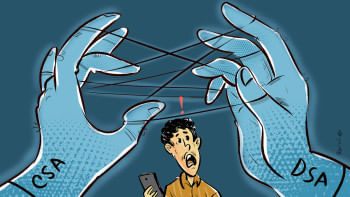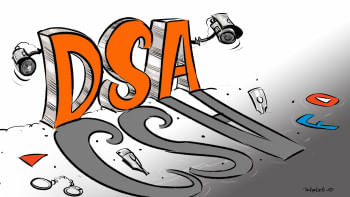Khadija’s ordeal and the questions we need to ask

Khadijatul Kubra, a student of political science at Jagannath University, was supposed to complete her third year of undergraduate studies by the end of this year. As the daughter of a Kuwait expat father and a struggling mother, at this moment, she would probably support her family with part-time jobs while preparing for a bright career. According to her classmates and teachers, Khadija is smart, intelligent, well-informed and a studious person. She loves her studies and to explore beyond the classroom and textbooks. She was also a lance corporal of Bangladesh National Cadet Corps and the class representative at her department.
Unfortunately, such a prospective talent has been languishing in jail for more than a year.
In 2020, when most university students were suffering from prolonged inactivity that led many of them to mental health issues due to months-long shutdowns and hardly accessible online classes, Khadija did not sit idle. Although she was only a fresher at the time, she became a familiar face on her campus by hosting webinars on social issues, politics and human rights, connecting people from home and abroad. She hosted webinars on the living conditions and struggles of Bangladeshi migrant workers during Covid, the state of student politics and students' rights at Jagannath University, democracy in Bangladesh, and so on.
In October 2020, former army officer Major (retd) Delwar Hossain joined in one such webinar, and at one point, he criticised the current government. Only for hosting this webinar, Khadija, along with Delwar Hossain who lives in Canada, was charged under the draconian Digital Security Act (DSA). As per media reports, police filed two cases with two police stations, but the words in the charge sheets filed against her are similar. In both cases, Khadija has been accused of foiling the current political situation, involving common people in anti-state activities, and defaming the image of Bangladesh abroad.
This was just the beginning of the persecution against Khadija, just a 17-year-old girl when she hosted the webinar and when the DSA cases against her were filed with Kalabagan and New Market police stations, according to her identity and academic documents. Per the Children's Act, 2013, Khadija's age must be considered from the day of the occurrence of the incident. Therefore, per the law, Khadija is entitled to be treated as a child, her trial has to be processed by the juvenile court, she can be taken into custody only for the shortest possible duration, and even if she has to be taken into custody, she can only be detained in a child development centre, not in any jail.
In one case, police recorded Khadija's age as 19 years, and in the other case 22 years. This is a flagrant violation of the Children's Act, where it has been clearly stated that if the police detain a person who may be below 18 years of age, the person's age must be determined by the investigation officer by checking their identity papers and other documents. Also, a probation officer and the parents of the accused have to be involved in the process. If the age cannot be confirmed through papers, the person has to be produced before a children's court. The court, after thorough investigation, will decide on the person's age.
Khadija's ordeal has exposed some flawed sides of our legal system that hold us responsible to raise some questions. For instance, does the state have the right to incarcerate a citizen without any trial and without proving their guilt? Especially when there are plenty of examples where people accused of serious offences such as rape, murder and money laundering are getting bails and in many cases, they have gotten anticipatory bails?
No such procedure was followed in this case. Almost two years after filing the cases, police picked Khadija up from her home at Mirpur on August 27, 2022. According to her family members, even moments before her arrest, they did not have any idea that she had been sued under the DSA.
Khadija was produced before the Cyber Tribunal where her appeals for bail were rejected three times, and she was sent to jail even before the beginning of her trial. Reviewing her appeal for bail, the High Court granted her permanent bail on February 16 this year, but when the state party challenged this verdict before the Appellate Division, a full bench led by the chief justice postponed the hearing of the bail petition for four months.
Unfortunately, in none of the hearings did the court raise any concern over how the police determined Khadija's age during their investigations.
Jailed without any trial, Khadija did not get any opportunity to prove her innocence. Meanwhile, her academic career has been stalled. The court did not issue any directive to the jail and the university authorities to allow her to appear in the examinations from jail. As a result, she is already two semesters behind in her studies.
According to her family members, Khadija has been suffering from kidney disease. So far, she has not received any specialised medical treatment other than treatment by the jail doctors.
Students and teachers of all universities, human rights activists and organisations at home and abroad have been vehemently protesting against such a cruel treatment of a minor girl. Breaking free from the shackles of intimidation, people are now staging demonstrations demanding her immediate release.
One can't help but wonder: is such a vicious application of DSA against a 17-year-old university student not tarnishing the image of Bangladesh and the incumbent government? What did the government and its judicial administration achieve by detaining a bright female student without any proven crime?
Khadija's ordeal has exposed some flawed sides of our legal system that hold us responsible to raise some questions. For instance, does the state have the right to incarcerate a citizen without any trial and without proving their guilt? Especially when there are plenty of examples where people accused of serious offences such as rape, murder and money laundering are getting bails and in many cases, they have gotten anticipatory bails? If Khadija is granted bail in the coming months, how will the state ensure that she recovers her health and continues her studies? If she is proven innocent, how will the state compensate her for the irrecoverable losses she is suffering during her pretrial incarceration?
Unless and until our legal system is reformed, these questions need to be asked repeatedly to ensure that no other talented mind like Khadija is silenced by the state and its laws that we envisioned to protect our rights.
Md Shahnawaz Khan Chandan is assistant professor at the Institute of Education and Research, Jagannath University. He can be reached at [email protected].
Views expressed in this article are the author's own.
Follow The Daily Star Opinion on Facebook for the latest opinions, commentaries and analyses by experts and professionals. To contribute your article or letter to The Daily Star Opinion, see our guidelines for submission.

 For all latest news, follow The Daily Star's Google News channel.
For all latest news, follow The Daily Star's Google News channel. 










Comments